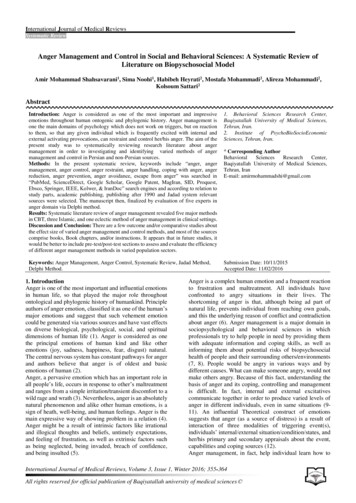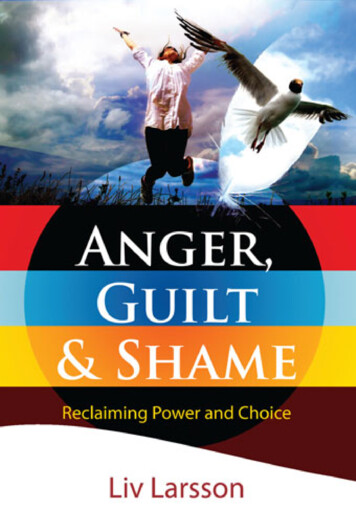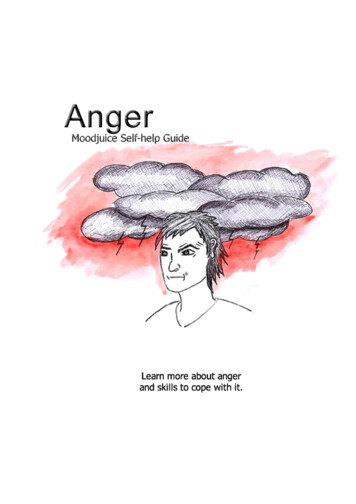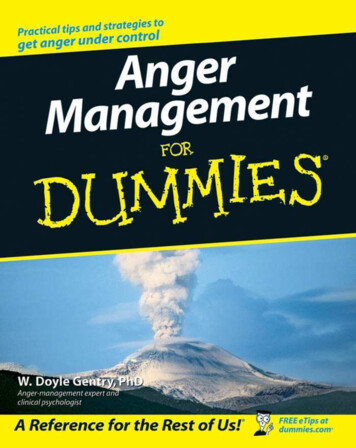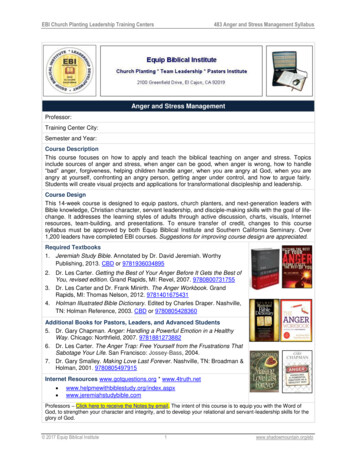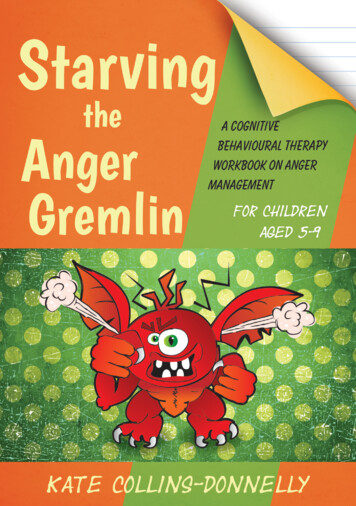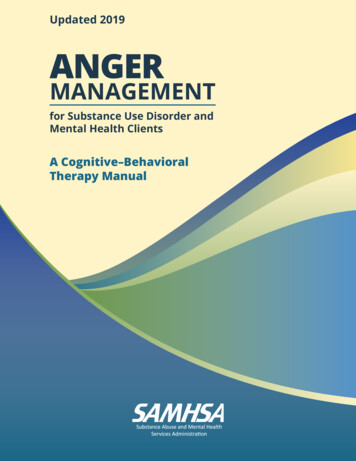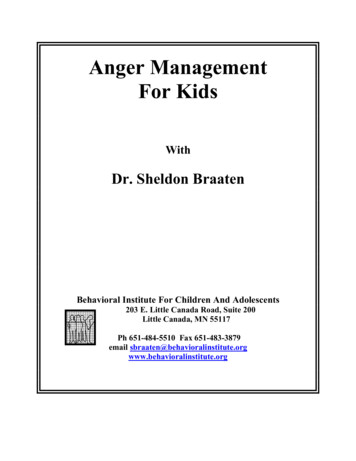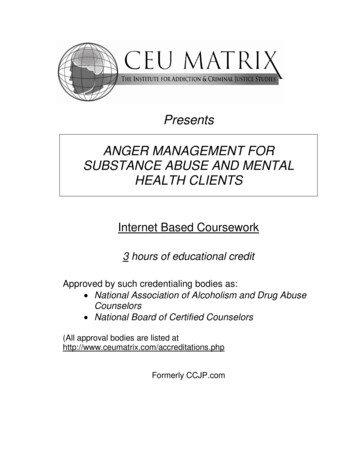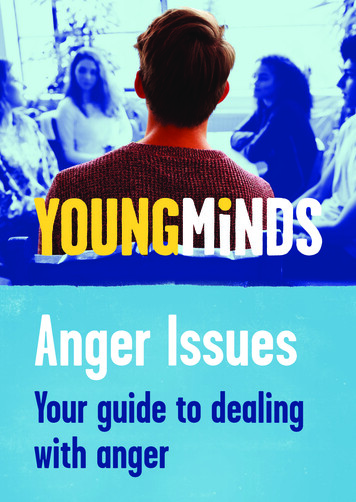
Transcription
Anger IssuesYour guide to dealingwith anger
“In my family no-one shows they areangry well, apart from my Dad.Everyone just keeps it inside. SometimesI go up to my bedroom and just want tosmash things up.”youngminds.org.uk/anger-issues
We all get angry sometimesAnger is one of a normal range of emotions that we allexperience. Sometimes, though, you can feel angry andnot know why.It’s important to be able to deal with anger so you don’tlose your temper and make things worse.This booklet will help you to identify when angerbecomes ‘too much’ and help you find ways to manage it.1
What makes us get angry?Lots of things can make us angry. That’s fine, as long as itdoesn’t get out of control.Here are a few things that could make you get angry: Being embarrassed in front of other people Changes in the family like divorce or separation Being let down Something that feels unfair Not being listened to Feeling lonely or rejected Pressure from school or at home Death in the family Being bullied Being hurt or abusedyoungminds.org.uk/anger-issues
What happens when angergets too much?Anger is an issue if you are: Hitting or physicallyhurting other people Shouting at people Breaking things Winding people up Spending time withpeople who you knowwill get you into trouble Losing controlOr sometimes, people turn their anger on themselvesand it can lead to: Eating problems Refusing to go to school Feeling low Not talking to anyone Putting ourselves in Harming ourselvesdanger Abusing alcohol or drugsSome of these things might make you feel better in theshort term or give a sense of ‘relief’ but they can maketrouble for you later and lead to other problems.3
Dealing with your anger:spotting the warning signsThe first step in dealing with your anger is to learnto recognise when you’re getting angry. Your body ishelpful here as there are a number of warning signals asadrenaline rushes through your veins: Clenched teeth Tense shoulders Increased heart rate Clenched fists Tense muscles Tight stomachWhen these signs appear, you know you’re about toget angry – that’s when it’s handy to have a copingmechanism. The next time you feel angry, try and takenotice of how your body changes, so you will know whatto look for in the future.youngminds.org.uk/anger-issues
“My heart was pounding and myhands were sweaty. I couldn’t keepstill – I had so much energy. I couldn’tfocus on anything. I couldn’t evensleep properly”5
Dealing with your anger:coping mechanismsWhen anger rises, it’s important to find ways of relaxingand taking control of your anger. Everyone relaxes indifferent ways, but it could be worth trying to exploresome of the following to help you: Talking to someone toput things in perspective Listening to music Taking slow, deepbreaths Going for a walk Having a long, hot bath Try meditation or yoga Playing a high energysport like football,cycling or running Playing a computergame Drawing, painting orwriting in your diary tolet out how you feelIt’s worth trying a few out to see which works best foryou. Then next time you start to feel angry, you can turnto your trusted way of relaxing.youngminds.org.uk/anger-issues
Avoiding angerCoping mechanisms can help you manage your anger inthe heat of the moment, but the best long-term solutionfor many anger issues is to try and prevent your angerfrom bubbling up in the first place.Like when having a discussion. If you don’t agree withsomeone, try and hear their point of view first, and staycalm when you’re responding. Sometimes it can behelpful to leave the conversation if things are gettingheated, and to come back when you’re able to discussthings more calmly. This can help to avoid conflict byworking out a compromise and avoiding anger entirely.Or, if someone is annoying you such as teasing you atschool, try to stay calm and get help by telling someoneyou trust about what is happening.7
Getting help for youranger issuesIt can be hard to know why you get angry – often angerissues stem from something that happened a long timeago and now you over-react to all situations, not just theoriginal trigger.Talking to the person who makes you angry is always best.But sometimes that’s not possible.So try talking to someone you trust like a brother or sister,a parent, a teacher, school counsellor or nurse.If that doesn’t work, talk to your GP. They should be able torefer you to a counsellor or a professional who’ll help youmanage and deal with your anger.All these services are confidential too, so you don’t have totell anyone you don’t want to.youngminds.org.uk/anger-issues
Who else to talk toyouthaccess.org.ukInformation and advice on counselling services for peopleaged 12–25. Visit the website and click ‘Find a service’.childline.org.ukThe UK’s free helpline for children and young people– it’s a confidential service and provides telephonecounselling for any child with a problem.Helpline: 0800 1111Textphone: 0800 400 222Mon-Fri 9:30am-9:30pm Sat and Sun: 11am-8pmthemix.org.ukOffers free support and advice for under 25s through aconfidential helpline, online chat and discussion boards.Helpline: 0808 808 49947 days a week 2pm – 11pm9
ParentsHelpline0808 802 5544youngminds.org.ukMon-Fri 9.30am-4pmYoungMindsFourth Floor, India House45 Curlew StreetLondon SE1 2NDTelephone 020 7089 Registered charity number: 1016968Company limited by guarantee number: 02780643Thank you to Dr Andrea Gnanadurai and her colleagues at the Childand Family Public Engagement Board, Royal College of Psychiatry forfact checking this booklet.
Avoiding anger Coping mechanisms can help you manage your anger in the heat of the moment, but the best long-term solution for many anger issues is to try and prevent your anger from bubbling up in the first place. Like when having a discussion. If you don’t agree with
